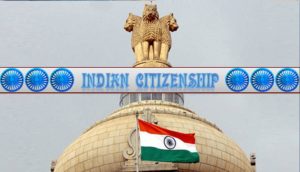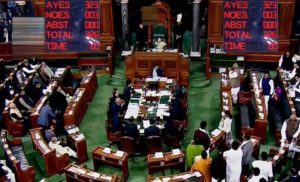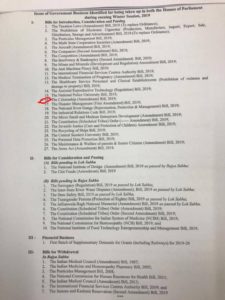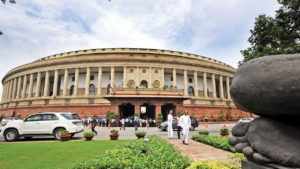AnalyticsBreaking News
The Citizenship Bill in its new incarnation likely to be tabled in the winter session of Parliament, writes Urmisree Deb

November 15: The Constituent Assembly finalised the Constitution on November 26, 1949 and the Constitution came into force on January 26, 1950. It has marked a crucial change in the status of the people of India. They were no longer British subjects, but citizen of the Republic of India and derived their status as such from the constitution, which they, in their collective capacity as the people of India, enacted, adopted and gave themselves.
 While the word ‘Citizen’ is not defined in the Indian Constitution, Part II (Articles 5 to 9) of the Constitution determine who are Indian citizens at the commencement of the Constitution and Article 10 provides for their continuance as such citizens, subject to the provisions of any law that may be made by the Parliament. The Constitution does not, however, make any provision with respect to the acquisition of citizenship after its commencement or the termination of citizenship or other matters relating to citizenship.
While the word ‘Citizen’ is not defined in the Indian Constitution, Part II (Articles 5 to 9) of the Constitution determine who are Indian citizens at the commencement of the Constitution and Article 10 provides for their continuance as such citizens, subject to the provisions of any law that may be made by the Parliament. The Constitution does not, however, make any provision with respect to the acquisition of citizenship after its commencement or the termination of citizenship or other matters relating to citizenship.
 Article 11 of the Constitution authorized the Parliament to make laws pertaining to acquisition and termination of citizenship subsequent to the commencement of the constitution. The Citizenship Act, 1955, came into force on 30 December, 1955. It provides elaborate provisions specifying how citizenship could be acquired by birth, descent, registration, naturalisation and incorporation of territory and for termination and deprivation of citizenship under certain circumstances. Following the Assam Accord in 1985, an amendment was made to the Citizenship Act in 1986, which inserted Section 6A of the Citizenship Act,1955, making way for a sixth type of citizenship applying to the State of Assam.
Article 11 of the Constitution authorized the Parliament to make laws pertaining to acquisition and termination of citizenship subsequent to the commencement of the constitution. The Citizenship Act, 1955, came into force on 30 December, 1955. It provides elaborate provisions specifying how citizenship could be acquired by birth, descent, registration, naturalisation and incorporation of territory and for termination and deprivation of citizenship under certain circumstances. Following the Assam Accord in 1985, an amendment was made to the Citizenship Act in 1986, which inserted Section 6A of the Citizenship Act,1955, making way for a sixth type of citizenship applying to the State of Assam.
 On 19 July 2016, the BJP-led NDA Government introduced the Citizenship (Amendment) Bill, 2016 in the Lok Sabha with the intention to further amend the Citizenship Act, 1955 and thereafter referred to a Joint Parliamentary Committee on August 12, 2016. The Joint Parliamentary Committee submitted its report to Lok Sabha as on 7 January 2019. The Committee submitted its report along with the fresh Citizenship Amendment Bill. After considering the report and suggestions submitted by the Committee, the Lok Sabha passed the bill as “The Citizenship (Amendment) Bill, 2019” on 8 January 2019. But it was not tabled in Rajya Sabha which was adjourned sine die on 13 February, 2019. Ultimately, the bill lapsed due to the dissolution of 16th Lok Sabha.
On 19 July 2016, the BJP-led NDA Government introduced the Citizenship (Amendment) Bill, 2016 in the Lok Sabha with the intention to further amend the Citizenship Act, 1955 and thereafter referred to a Joint Parliamentary Committee on August 12, 2016. The Joint Parliamentary Committee submitted its report to Lok Sabha as on 7 January 2019. The Committee submitted its report along with the fresh Citizenship Amendment Bill. After considering the report and suggestions submitted by the Committee, the Lok Sabha passed the bill as “The Citizenship (Amendment) Bill, 2019” on 8 January 2019. But it was not tabled in Rajya Sabha which was adjourned sine die on 13 February, 2019. Ultimately, the bill lapsed due to the dissolution of 16th Lok Sabha.
 The central government during the last session of the Parliament passed many small and big bills. It also includes an important bill abrogating Article 370. Now, the Central Government has started its preparation to get the Citizenship Amendment Bill passed in the winter session of the Parliament. The government plans to introduce the bill in Parliament, probably in the first/second week of the winter session starting on November 18.
The central government during the last session of the Parliament passed many small and big bills. It also includes an important bill abrogating Article 370. Now, the Central Government has started its preparation to get the Citizenship Amendment Bill passed in the winter session of the Parliament. The government plans to introduce the bill in Parliament, probably in the first/second week of the winter session starting on November 18.
 AMENDMENTS INTRODUCED BY THE 2019 BILL IN THE BILL of 2016:
AMENDMENTS INTRODUCED BY THE 2019 BILL IN THE BILL of 2016:
As discussed above, the 2019 bill was passed by the Lok Sabha as on 8 January, 2019 and the said bill introduced certain modifications in the 2016 bill. The amendments introduced by the 2019 bill in the 2016 bill are as follows:
a) A new proviso has been added in section 2(1) after clause b of the Principal Act (The Citizenship Act, 1955) which was not introduced by the 2016 bill. The new proviso reads as follows:
“After the Commencement of The Citizenship (Amendment) Act, 2019, proceedings or disputes of any nature against any person mentioned in the first proviso (the first proviso has also been introduced by the 2016 bill and earlier it was not present in the Principal Act) shall be cancelled and such person shall become eligible to acquire Indian Citizenship by way of Naturalisation under section 6 of The Principal Act.”
b) A new proviso has been inserted in Section 7D after clause (f). The said proviso reads as follows:
“Registration of Overseas Citizens of India Cardholder shall not be cancelled under this section unless the said citizens have been given a proper chance of being heard.”
 AMENDMENTS PROPOSED BY THE BILL:
AMENDMENTS PROPOSED BY THE BILL:
The said bill proposed the following amendments to the Principal Act, i.e., The Citizenship Act, 1955, namely:
a) Amendment of Section 2(1), After Clause B, of the Citizenship Act, 1955:
(i) Two provisos have been added by the bill namely; first proviso allows the unlawful migrants, who have been excluded by the Central Government or excluded under the Passport (Entry into India) Act, 1920 or under the Foreigners Act, 1946, belonging to the six particular minority communities namely, Hindus, Sikhs, Buddhists, Jains, Parsis and Christians from 3 particular countries namely, Afghanistan, Bangladesh and Pakistan, to apply for the Indian Citizenship under the Principal Act . Basically, the first proviso says that such persons excluded under the Passport (Entry into India) Act, 1920 or from the application of the provisions of the Foreigners Act, 1946, shall not be regarded as illegal migrants for this purpose of this Act.
(ii) Second Proviso says that after the enactment of the Citizenship (Amendment) Act, 2019, all the disputes or proceedings against any person mentioned in the first proviso shall stand cancelled and they will become eligible to apply for the Indian Citizenship by way of Naturalisation under section 6 of the Principal Act.
 b) Amendment of Section 7D, After Clauses D & F, of the Citizenship Act, 1955:
b) Amendment of Section 7D, After Clauses D & F, of the Citizenship Act, 1955:
(i) One new clause and one new proviso have been added by the said bill. Clause (da) allows the Government to cancel or to terminate the registration of the overseas citizens of Indian Cardholder if they violate any provision or rule of this Act or of any other Act or Law for the time being in force.
(ii) A new proviso has been added after Clause (f) of Section 7D. This proviso maintains a check on the power of the Government granted under Clause (da) of Section 7D. This proviso says that the Government cannot terminate the registration of overseas citizens of Indian Cardholder without providing them with a proper chance of being heard.
 c) Amendment of Third Schedule Clause (d), The Citizenship Act, 1955:
c) Amendment of Third Schedule Clause (d), The Citizenship Act, 1955:
Under this amendment, the period has been reduced to 6 years from 11 years.
The proposed New Citizenship (Amendment) Bill, 2019 may not violate the spirit of Article 14, as mentioned earlier, as it upholds the test of reasonable classification as propounded by a seven Judge Bench in the State of West Bengal Vs. Anwar Ali Sarkar. Based on the clear classification adopted in the Bill, which is clear and substantial, there are sufficient reasons for making the distinction. There can be no element of arbitrariness in the classification proposed by virtue of these just reasons.
 With regard to Article 25, the proposed Amendment Bill does not, in anyway, affect the right of any person to freely profess, practice and propagate his/her religion in the country. On 4 October, 2019, the Hon’ble Supreme Court of India has also observed in Civil Appeal No. 7802 of 2019 , RAJASTHAN STATE ROAD TRANSPORT CORPORATION -Versus-DANISH KHAN in para 8 of this Judgement followed by State of Mysore & Anr vs P. Narasing Rao, 1968 SCR (1) 407 as follows-
With regard to Article 25, the proposed Amendment Bill does not, in anyway, affect the right of any person to freely profess, practice and propagate his/her religion in the country. On 4 October, 2019, the Hon’ble Supreme Court of India has also observed in Civil Appeal No. 7802 of 2019 , RAJASTHAN STATE ROAD TRANSPORT CORPORATION -Versus-DANISH KHAN in para 8 of this Judgement followed by State of Mysore & Anr vs P. Narasing Rao, 1968 SCR (1) 407 as follows-
“It is well-settled that though Article 14 forbids class legislation, it does not forbid reasonable classification for the purposes of legislation. When any impugned rule or statutory provision is assailed on the ground that it contravenes Article 14, its validity can be sustained if two tests are satisfied. The first test is that the classification on which it is founded must be based on an intelligible differentia which distinguishes persons or things grouped together from others left out of the group; and the second test is that the differentia in question must have a reasonable relation to the object sought to be achieved by the rule or statutory provision in question.”





